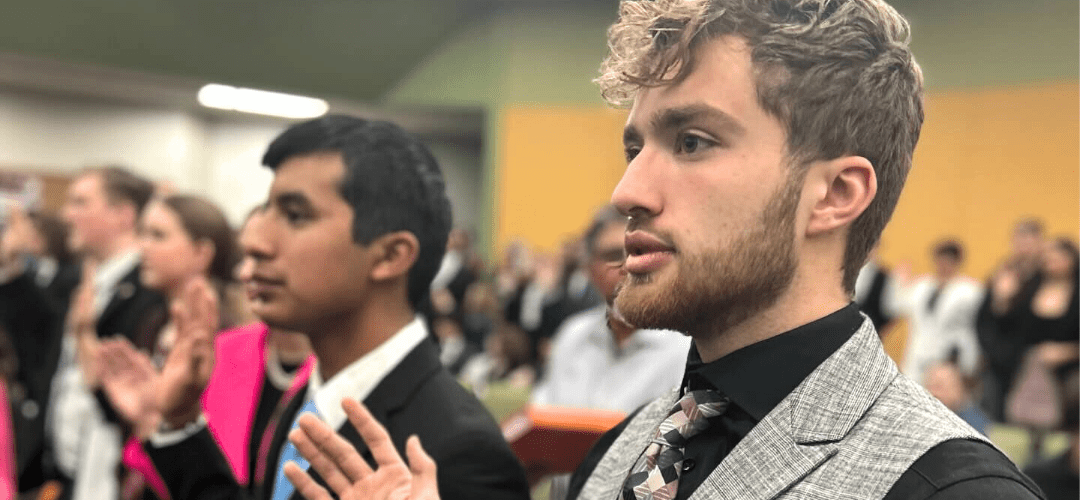ATEMS seniors Gavin Hail and Tristan Reyna have been such good friends over the last three or four years that they can, almost literally, complete each other’s sentences. They seem to know what the other thinks and can tell without prompt where the conversation is going.
Perhaps that’s what made them so good together in the recent UIL Congress state meet, where Hail finished third in the state in the Class 2A competition (they were each competing for ATEMS, where they take the majority of their classes each day) and Reyna in the top 10 and was named the Outstanding Presiding Officer.
They also plan to attend college together starting in the fall, majoring in engineering while minoring in pre-law with the intent of working in patent law. If it seems they have their lives mapped out, that is correct. And they credit some of that to the UIL Congress competition.
The competition is an individual contest in a large group setting that models the legislative process of democracy, specifically, the United States Congress. Within this mock legislative assembly competition, contestants draft legislation (proposed laws and position statements) submitted to the tournament, and they research the docket of bills and resolutions dealing with real-world social and political policies before the contest to prepare their speeches.
At the state tournament, students caucus in committees, deliver a formal discourse on the merits and disadvantages of each piece of legislation, and vote to pass or defeat the measures they have examined. Parliamentary procedure forms the structure for the discourse, and students extemporaneously respond to others’ arguments throughout a session.
A few months before the competition, the contests are each given a list of bills to be argued (10 per day, or 20 over the two-day state competition). The students must research and form arguments in either the affirmation or negation for all 20 bills and ready themselves to stick to their argument in the face of what can be withering cross-examination by their peers.
Hail and Reyna have different specialties and ways to make and attack arguments during the competition.
“My specialty is in analyzing the structure of the argument,” said Hail, the No. 1 singles and doubles player on the boys’ tennis team at Cooper High School. “I’m not going to structure my argument against someone on what the argument is, but rather how the argument was made. I like UIL Congress because I get to ask someone how they came to their conclusion and pick at that. I don’t have to argue against a person; I can argue against the argument.”
Reyna, meanwhile, is more analytical in his approach.
“I’m going to do a ton of research and gather statistics and data to back my points,” said Reyna, a Cooper gymnast who will defend his District 4-5A all-around title March 6-7 at the district championship meet in San Angelo. “My style isn’t to attack the person but to rely on statistical data and research in my questioning.”
Hail has made it to the state finals in UIL Congress in each of his four years in high school, while Reyna – who has only been doing UIL Congress competitions for two years – made it to the finals for the first time this year. One of the reasons for their success – aside from their competitive nature and need to push each other – is their attention to the details in the world around them.
Many of the bills the duo had to prepare for are the same issues facing the actual United States Congress: regulating Artificial Intelligence, the death penalty, regulating the buying and selling of human organs, how to curtail food shortage in America, and the popular vote vs. the Electoral College as a way of deciding the presidential election.
“You have to stay up with what’s going on around you if you want to be successful in this competition,” Reyna said. “We’re both taking government for dual credit through Cisco, and there hasn’t been a subject we’ve talked about in that class that we haven’t researched for competition. Our teacher will ask a question in class, and we immediately know the answer.”
Many students who participate in UIL Congress and other competitions similar to it around the country often end up in politics later in life. And neither Hail nor Reyna would discount a turn at a political career in the future.
“I think I’d be interested in it after a couple of practicing law,” Reyna said. “My relatives have all tried to tell me not to go into politics because it can be ugly. But we need good people in politics. We need people willing to dig in and do the dirty work but in a good way.”
Hail has also considered a career in politics, but not as the frontman for a candidate.
“I’ve thought about this for a while, and I wouldn’t want to be the front man,” he said. “You can have just as much power, control, or money – if those are the things you want – being the second in command without as many publicity issues as the person out front. A position like Chief of Staff has a lot of power and presence without some of the issues that are part of being the face of the campaign, and I think that would suit me best.”
And who could argue that either one of these students won’t make it happen?












